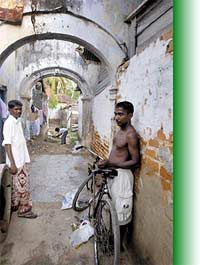Revolution #89, May 20, 2007
From the pages of Revolution...(and available at revcom.us)
|
Week in and week out Revolution takes you beneath the surface and behind the headlines. From the U.S. plans for war against Iran to the latest Supreme Court assault on women; from the police murder of Black youth to the strategic dimensions of the battle around immigration and the U.S.-Mexican border—on all these fronts and more Revolution gets to the truth behind the biggest stories of the day.
Revolution takes you to the scene of the struggle. Readers of Revolution traveled to Atenco and Oaxaca in Mexico through the eyes and ears of young reporters who lived with, learned from, and wrote about seismic struggles in Mexico in articles like The Changing Landscape of the Mixteca, and Reporter's Notebook from Atenco, Mexico: Real Women Have Machetes. Readers of this paper traveled to New Orleans through correspondence from young reporters who joined efforts to fix up homes and schools. Revolution correspondent Sunsara Taylor plunged you firsthand into the rallies of the Christian Fascist youth movement Battle Cry, and correspondent Mary Lou Greenberg reported from last year’s European March Against the Oppression of Women in Iran. From the May 1 police assault in LA this year to the front lines of the battles to drive out the Bush regime, Revolution takes you there.
Correspondent Michael Slate took readers of this paper to the townships of South Africa during the 1980s; to South Central, Los Angeles following the 1992 L.A. Rebellion; to the mountains of Chiapas, Mexico; and in 2005, to the tsunami-struck coast of Sri Lanka. Li Onesto was the first foreign journalist to travel to Nepal and tell the story behind the launching of the people's war there. Larry Everest, author of the book Oil, Power, and Empire, contributes exposure and analysis regularly in Revolution on Iraq, Iran, and the Middle East. And in all this, what stands out about Revolution is not only the hidden stories and unique analyses, but the way you hear the voices of the people on the bottom who have taken up the struggle.
But Revolution is about more than that…
It was in the pages of Revolution that readers first read the series that became Ardea Skybreak's acclaimed book The Science of Evolution and the Myth of Creationism/Knowing What’s Real—and Why it Matters (Insight Press, 2006). And Revolution regularly covers other issues in the realm of science and epistemology.
Revolution consistently challenges religion, especially the "Dark
Ages" fundamentalism
that permeates society today, in graphics, articles and the major series
like God, The Original Fascist.
It was in the pages of Revolution that readers could find Raymond Lotta's series Socialism is Much Better Than Capitalism and Communism Will Be a Far Better World. This series surveyed the much-distorted, but actually breathtaking, accomplishments of the socialist revolutions in Russia and then China, and has enabled readers of Revolution to deconstruct and get to the bottom of the apologies for capitalism.
When great events shake the world, or when life-changing questions are posed broadly in society, Revolution responds with special issues and supplements: The Nazification of the American University helped students and faculty begin to connect the dots and confront ominous attacks on critical thinking and free speech. Hundreds of thousands of copies of a special issue of Revolution, speaking to the abandonment of the people of New Orleans, were distributed all over the country in the wake of Hurricane Katrina. On May First of this year, tens of thousands of copies of a special issue, We Are Human Beings, We Demand a Better World, We Will Not Accept Slavery in Any Form, were distributed at immigrant rights marches around the U.S. And, at a moment when people are looking for and need genuinely revolutionary leadership to change the world, over 3,000 people distributed over 500,000 copies of The Crossroads We Face, The Leadership We Need, a Special Issue on Bob Avakian.
Revolution is also about debate and polemics. From critiques of Thomas Friedman’s The World Is Flat to the debate over the real parallels between the Bush Regime and the Nazis; from what stand to take toward Islamic fundamentalism to how to view the Democrats—Revolution crackles with argument and challenges your assumptions.
Revolution's reviews, interviews, and commentary on the arts expose readers to a wide range of cultural events, from a non-dogmatic but thoroughly revolutionary communist perspective: In the midst of societal debate, Revolution wrote Why Imus Had to Go… & What It Says About This Racist, Sexist System. Revolution reviewed Wynton Marsalis' album From the Plantation to the Penitentiary, the Dixie Chicks documentary Shut Up & Sing; the movie Jesus Camp; and Spike Lee's When the Levees Broke. And Revolution challenged the theater community with The Battle over My Name Is Rachel Corrie, and gave readers insights into Philip Roth's The Plot Against America.
* * *
In this brief survey of highlights from the pages of Revolution, you get a glimpse of what readers get from this paper weekly. And now, when people so badly need to understand the world to change it, Revolution must have a solid financial base to make a quantum leap in its circulation!
-30-
If you like this article, subscribe, donate to and sustain Revolution newspaper.





